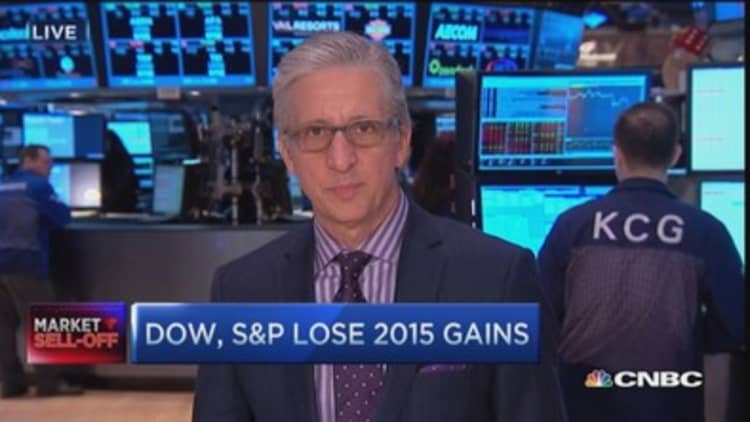


U.S. stocks closed more than 1.5 percent lower at one-month lows on Tuesday, pressured by a surge in the dollar and some weakness in oil.
The Dow Jones industrial average fell more than 300 points to below the index's 50-day moving average, wiping out gains for the year. The S&P 500 also closed in the red for the year and breached its 50-day moving average, which is an indicator of the market trend. Only the Nasdaq held onto gains of 2.61 percent for the year.
There's "concern that energy and the strength in the dollar will somehow be negative for the equities," said Art Hogan, chief market strategist at Wunderlich Securities. He noted that the speed of the dollar's surge was the greatest market driver, amid mixed economic data and concerns about the Federal Reserve raising interest rates.
Read MoreMighty dollar: Casualties rise in 'currency war'
The U.S. dollar advanced more than 1 percent to 12-year highs as the euro fell below $1.07 for the first time in nearly 12 years on the beginning of quantitative easing in the euro zone.
The dollar "is getting to very dangerous levels because of the euro," said Peter Cardillo, chief market economist at Rockwell Global Capital. He added that "we're probably going to see a short-term top, although not anytime soon."
"We're also at psychologically low levels," he said. "If the S&P closes under 2,050, then perhaps the technical correction may be in full force."
US Dollar index, since 1985
Source: FactSet
The Dow and S&P both had their worst day of the year since Jan. 5.
The Dow Jones Industrial Average closed down 332.78 points, or 1.85 percent, at 17,662.94, with United Technologies the greatest laggard as all blue chips except DuPont declined.
The closed down 35.27 points, or 1.70 percent, at 2,044.16, with information technology leading all 10 sectors lower.
The Nasdaq closed down 82.64 points, or 1.67 percent, at 4,895.79.
"This (selloff) is a continuation of what we saw on Friday," said Robert Pavlik, chief market strategist at Boston Private Wealth. He said the S&P 500 could fall to 1,905 in the next few weeks and is watching trade volume as an indicator.
Exchange volume above Friday's 903 million would "tell me there's more downside to go," Pavlik said.
About three shares declined for every advancer on the New York Stock Exchange, with an exchange volume of 851 million and a composite volume of 3.6 billion in the close.
High-frequency trades accounts for 47.5 percent of average daily trade volume, according to TABB Group. During the peak levels of high-frequency trade in 2009, about 61 percent of shares traded daily were high-frequency trade.
Some analysts said investors should watch for a sustained downward trend rather than a single technical indicator. The Dow closed up more than 100 points on Monday after plunging nearly 300 points on Friday.
"This is a transition phase for the market," said Krishna Memani, chief investment officer at OppenheimerFunds. He still expects equities to post gains for the year.
"The rest of the week I'm looking for some judgement with respect to growth trend in the U.S.," he added. While the Job Openings and Labor Turnover Survey report affirmed Friday's strong jobs report, Memani is looking for growth on the consumer end with retail sales later this week.
Job openings for January at 5 million were the highest level in 14 years, the U.S. Bureau of Labor Statistics said.
Wholesale inventories for January , beating expectations for contraction.
The National Federation of Independent Business' small business index for February was an encouraging 98.0, little changed from January's 97.9 but above the key level of 96 that Hogan recommended as a benchmark.
Read MoreStrategists see bull running on, but look at their track record
Fifteen years ago on this day in 2000, the Nasdaq set its all-time closing and intraday highs of 5,048.60 and 5,132.50, respectively.
U.S. stock index futures indicated a sharply lower open on Tuesday, following weakness in Europe, as a fresh dip in the oil price weighed on investor sentiment.
Crude oil futures settled down $1.71, or 3.42 percent, at $48.29 a barrel on the New York Mercantile Exchange. The decline comes after Goldman Sachs said in a note Monday that it expected U.S. crude to drop as far as $40 a barrel in the near-term.
Also on Tuesday, the U.S. Energy Information Administration revised upward its 2015 domestic oil production outlook, but lowered its 2016 forecast because it expects the slump in global prices to weigh on the country's shale boom next year.
Read MoreWhy oil decline could get ugly again soon
Gold futures settled down at $1,160.10 an ounce, their lowest level since November 2014.
The U.S. 10-year Treasury yield traded near 2.13 percent.
The CBOE Volatility Index (VIX), widely considered the best gauge of fear in the market, traded near 16.
American Eagle Outfitters, Analogic and Verifone are due after the bell.
European equities closed sharply lower on Tuesday, with investor sentiment curbed by the fall in the price of oil and ongoing negotiations surrounding Greece.
Read MoreRemembering Haines' legendary 2009 call
After the bell on Monday, chipmaker Qualcomm announced a 14-percent dividend hike to 48 cents per share as well as a $15 billion stock buyback program.
Credit Suisse has named Prudential chief Tidjane Thiam as its new chief executive officer. His appointment will become effective at the end of June, when current CEO Brady Dougan will step down. Prudential shares slipped more than 2 percent in pre-market trade, while Credit Suisse shares surged more than 7 percent in pre-market trade on anticipation of the new leadership team
UBS upgraded Hewlett-Packard to "buy" from "neutral," noting a recent pullback in the stock's price and CEO Meg Whitman's upgrade of the executive team.
Urban Outfitters reported quarterly profit of 60 cents per share, 2 cents above estimates, with revenue in line. Comparable store sales were up six percent for the quarter, better than the two percent reported for the full year. Urban's rise in comparable store sales was its first in a year.
"This improvement is definitely powerful for Urban and sets it apart from its peers," said Jeff Toohig of ITG Investment Research.
"I do think we're starting to see signs that the opportunity for the consumer market is moving in the right direction," he added.
Read MoreEarly movers: QCOM, CS, URBN, SWKS, PG & more
Skyworks Solutions will join the S&P 500 after the closing of trading Wednesday. The semiconductor maker will replace PetSmart—which is being sold to private equity firm BC Partners—in the benchmark index.
Major U.S. Indexes
As of Monday's close:
- The Dow Jones industrial average was within one standard deviation above its 50-day moving average. Since 1981 the index has been in this position 6.50 percent of all trading days, according to quantitative analytics tool Kensho. The probability of the index moving lower is 52.2 percent and the probability of it moving higher in the days following is 47.8 percent.
- The S&P 500 was within half a standard deviation above its 50-day moving average. Since 1980 the index has been in this position 5.22 percent of all trading days, according to Kensho. The probability of the index moving higher in the days following is 51.5 percent and the probability of it moving lower is 48.5 percent.
- The Nasdaq composite was within one-and-a-half standard deviations above its 50-day moving average. Since 1980 the index has been in this position 7.39 percent of all trading days, according to Kensho. The probability of the index moving lower is 61.7 percent and the probability of it moving higher is 38.3 percent.
—CNBC.com and Reuters contributed to this report.
Disclosure: CNBC's parent NBCUniversal is a minority investor in Kensho.
On tap this week:
Tuesday
Earnings: Analogic, China Lodging Group, Habit Restaurants, NCI Building Systems, Verifone
Wednesday
Earnings: Express, Vera Bradley, Box, Home Inns and Hotels, Krispy Kreme, Men's Wearhouse, Shake Shack
7:00 am: Mortgage applications
1:00 pm: $21 billion 10-year notes auctions
Thursday
Earnings: Dollar General, Hovnanian, Vail Resorts, El Pollo Loco, Springleaf, Aeropostale, OncoMed, JA Solar
8:30 am: Weekly jobless claims
8:30 am: Retail sales
8:30 am: Import prices
10:00 am: Business inventories
1:00 pm: $13 billion 30-year bond auction
Friday
Earnings: Ann
8:30 am: PPI
10:00 am: Consumer sentiment


